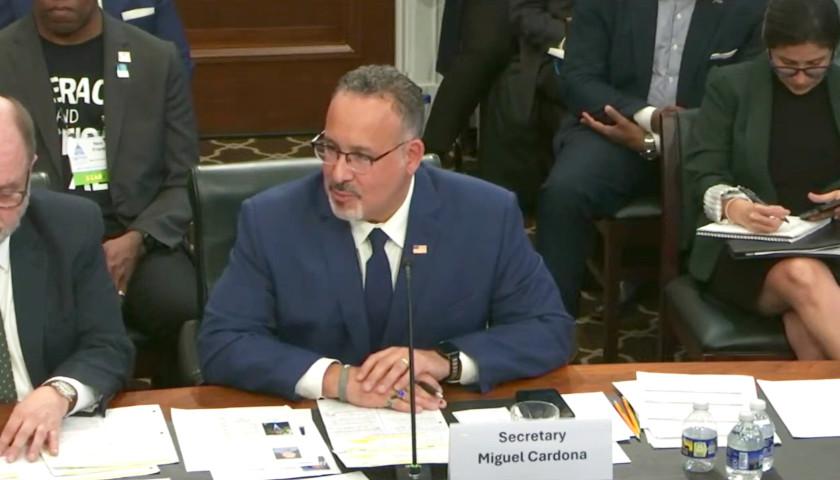Arizona State Senators Paul Boyer (R-Glendale) and Michelle Ugenti-Rita (R-Scottsdale) defeated several key election integrity bills in the Arizona Legislature last week as the only Republicans siding with Democrats. Republicans have a one-seat majority in the Senate, and since Boyer has angered Republicans for frequently voting with the Democrats against bills and thwarting election integrity efforts, he will not be seeking a third term after this year’s session. Former President Donald Trump endorsed former State Representative Anthony Kern (R-Glendale), a champion of election integrity, to replace him.
SB 1055, sponsored by State Sen. Kelly Townsend (R-Apache Junction), made any contractor who failed to provide election services or products guilty of a class 2 misdemeanor and liable for liquidated damages of the amount of the contract. Boyer was the only Republican to oppose it.
SB 1056, also sponsored by Townsend, would have prohibited ballots that have no chain of custody from being counted, and allows the voter to sue the government if that happens. Boyer was the only Republican to oppose it.
SB 1119, sponsored by State Sen. Sonny Borrelli (R-Lake Havasu City), would have required the posting of ballot images on the internet after an election. Both Boyer and Ugenti-Rita were the only two Republican senators to vote against it.
SB 1358, also sponsored by Townsend, would have ensured that state law takes priority over the state elections manual and ballots taken for a sample hand count would be segregated by precinct. Again, both Boyer and Ugenti-Rita were the only two Republican senators to vote against it.
SB 1359, another Townsend bill, would have required those accessing election systems to have unique passwords that required changing every two weeks. Boyer and Ugenti-Rita were the only two Republican senators to vote against it.
SB 1380, sponsored by State Sen. Wendy Rogers (R-Flagstaff), would have required county recorders to update voter registration addresses using the Post Office’s change of address notices. Boyer was the only Republican to oppose it.
SB 1457, sponsored by Borrelli, would have implemented requirements for voting machines and software, and prohibited voting machines at polling places and tabulation centers from connecting to the internet. Boyer and Ugenti-Rita were the only two Republican senators to vote against it.
SB 1465, another bill from Rogers, would have implemented requirements for voting machines and software. Boyer was the only Republican to oppose it.
SB 1475, also sponsored by Townsend, would have given the Arizona attorney general or county attorneys the authority to investigate elections. Boyer was the only Republican to oppose it.
SB 1476, another Townsend bill, would have numbered ballots consecutively. Boyer and Ugenti-Rita were the only two Republican senators to vote against it.
SB 1478, also sponsored by Townsend, would have prohibited boards of supervisors from requiring certain types of pens to be used to mark ballots, or providing ones that bleed through the paper, like Sharpies. Boyer and Ugenti-Rita were the only two Republican senators to vote against it.
SB 1570, another Townsend bill, prohibits voting machines at polling places and ballot tabulations from connecting to the internet, requires operators to check in when they are accessing them, and requires video of activity at tabulation centers to be recorded and posted online. Boyer was the only Republican to oppose it.
SB 1572, another bill from Townsend, would have required county recorders to post a list of registered voters on the internet immediately prior to elections, put tracking numbers on ballots that connect them to their digital images, and post the digital images after elections. Boyer was the only Republican to oppose it.
SB 1577, a Townsend bill, would have required county recorders to track ballots that are duplicated or adjudicated by separating them by type of defect or damage, listing them on the website, and forwarding a report to the legislature. Boyer was the only Republican to oppose it.
SB 1609, also from Townsend, would have required a new election if a court determined that the person declared the winner did not really win. Boyer was the only Republican to oppose it.
SB 1629, another one from Borrelli, would have required prompt deadlines for third parties returning voter registration forms, require those collectors to register and disclose other information, require county recorders to notify voters with permanently forwarded addresses that their ballots cannot be forwarded, establish signature verification training by the secretary of state, post images of ballots online after elections, and require election audits by the auditor general. Boyer and Ugenti-Rita were the only two Republican senators to vote against it.
SB 1642, sponsored by State Senate President Karen Fann (R-Prescott), would have established an election management system. Ugenti-Rita and Rogers were the only Republicans to oppose it.
Several election integrity bills did pass the Senate, and will go back to the House, where they’ll be heard in committee before the full House votes on them. One would change how the state approves its official elections manual and another makes it a crime to help someone vote in Arizona if they’re registered in another state. A bill that prohibits the state from entering into a court agreement called a consent decree for election-related disputes is waiting for Gov. Doug Ducey to sign.
A bill that would have decertified the election failed last month when State Rep. Rusty Bowers (R-Mesa) scheduled it for every House committee, ensuring its defeat. Boyer and Ugenti-Rita did not respond to a request for comment by the time this went to publication.
– – –
Rachel Alexander is a reporter at the Arizona Sun Times and The Star News Network. Follow Rachel on Twitter. Email tips to [email protected].
Photo “Paul Boyer” by BoyerAZ. Photo “Michelle Ugenti-Rita” by Michelle Ugenti-Rita. Background Photo “Election Day 2020” by Phil Roeder. CC BY 2.0.








